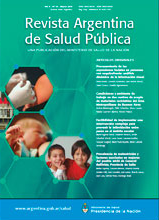Factors associated with the consumption of fruits and vegetables in Argentina: A multilevel study
Keywords:
Fruit and Vegetable Consumption, Multilevel Analysis, ArgentinaAbstract
INTRODUCTION: Some studies show an association between the evolution of the prevalence of non-communicable chronic diseases with eating patterns and nutritional situation of the population. The purpose of this research was to describe fruit and vegetable consumption in Argentina and its association with socio-economic, demographic and physical activity factors at individual, provincial and regional levels. METHODS: A multilevel model approach was used, with information provided in the Argentina National Survey of Risk Factors (2013) and National Census of Population (2001 and 2010). RESULTS: The model showed a positive association between fruit and vegetable consumption and being female, being older, having a monthly income over the ARS $4501 threshold and having finished secondary school. In contrast, being separated, divorced, widowed or single, and practicing moderate or low physical activity were negatively associated with the intake of fruits and vegetables. The effect of the variability at provincial and regional level turned out to be minimal. CONCLUSIONS: This work is part of a series of studies that link factors related to healthy eating with social and physical environments, mainly with socioeconomic characteristics of the peer group and its context. In this sense, it would be important to provide more disaggregated information.
Downloads
Downloads
Published
How to Cite
Issue
Section
License
Copyright (c) 2020 Revista Argentina de Salud Pública

This work is licensed under a Creative Commons Attribution-NonCommercial-ShareAlike 4.0 International License.


